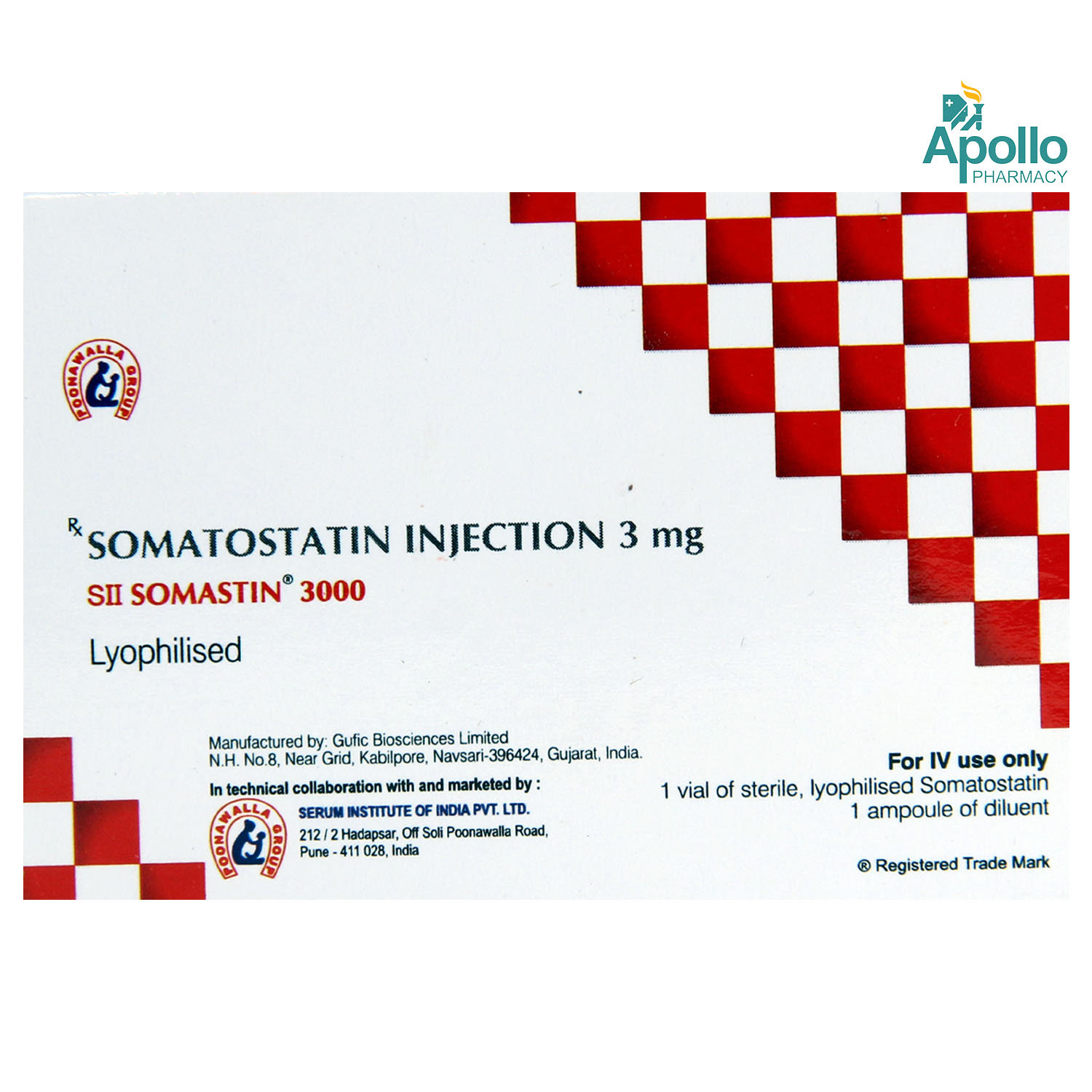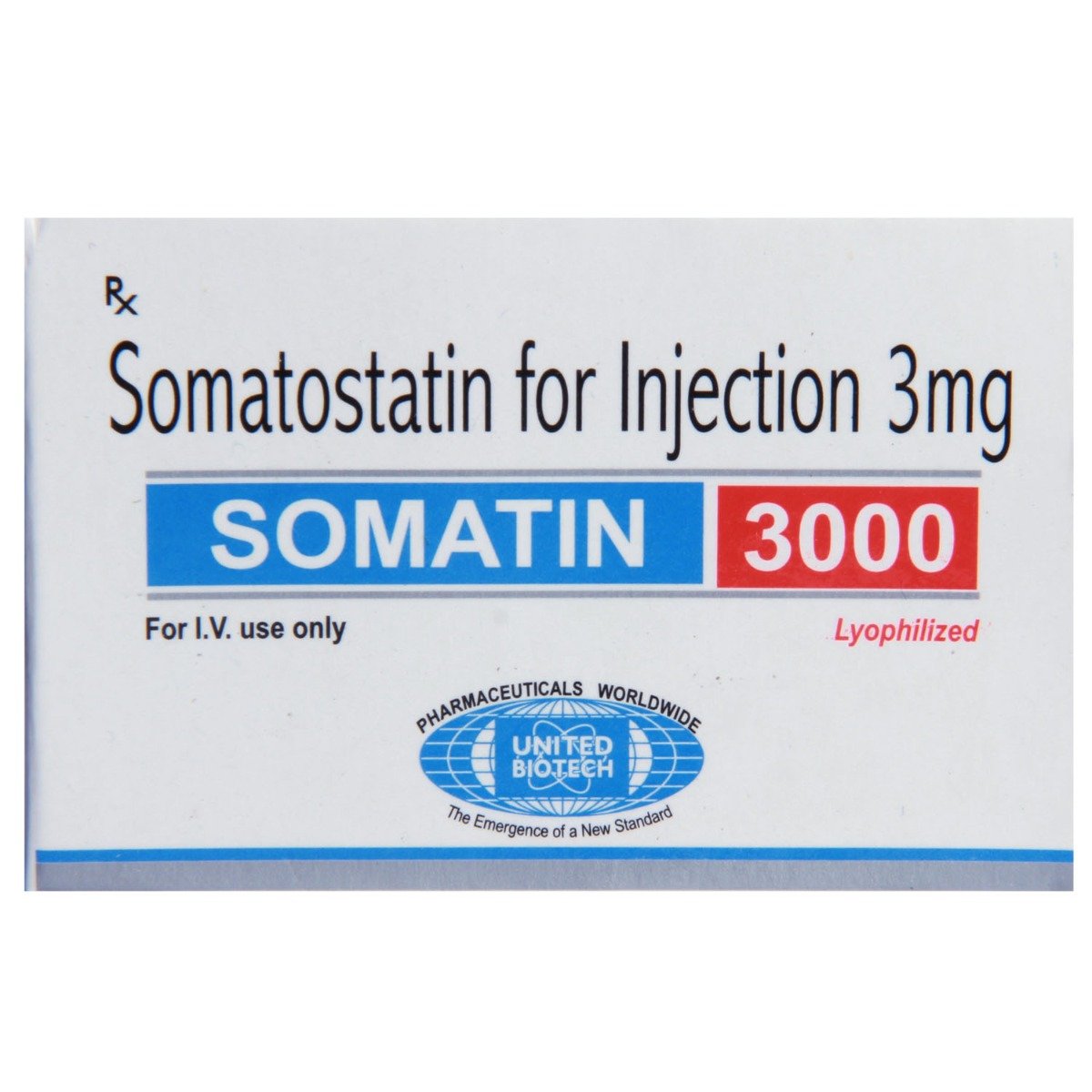Somatostatin
About Somatostatin
Somatostatin belongs to a class of medicines known as Hormones, used in the treatment of severe acute gastrointestinal hemorrhage (gastrointestinal bleeding) caused by gastric or duodenal ulcers, hemorrhagic gastritis (inflammation in the lining of your stomach) and esophageal varices (enlarged veins in the esophagus). Gastrointestinal hemorrhage (gastrointestinal bleeding) refers to the blood loss from any of the several organs of the digestive system that runs from your mouth to anus. It can occur due to anal fissures, colorectal cancer, rectal ulcers, crohn's disease or diverticulosis (small pouches, called diverticula, form in the lining of the colon).
Somatostatin contains Somatostatin as an active ingredient, which works by inhibiting the growth hormone, thyroid stimulating hormone, insulin and glucagon secretion as well as inhibition of stomach acid secretion. Additionally, it regulates the digestive system's ability to absorb nutrients, move food through the gut, control blood flow, and maintain the health and growth of gastrointestinal tissues.
Somatostatin will be administered by a healthcare professional. You may experience side effects such as diarrhea, abdominal pain, increased glucose level in blood, nausea, vomiting, flushing and injection site reaction. Most of these side effects of Somatostatin do not require medical attention and gradually resolve over time. However, if the side effects persist or worsen, please consult your doctor.
Inform your doctor if you are allergic to Somatostatin. Also inform your doctor if you have liver disease, kidney impairment, use any medications or have any pre-existing medical conditions. If you are pregnant or a nursing mother, it is advised to consult a doctor before receiving Somatostatin.
Uses of Somatostatin
Medicinal Benefits
Somatostatin is used in the treatment of severe acute gastrointestinal hemorrhage (gastrointestinal bleeding) caused by gastric or duodenal ulcers, hemorrhagic gastritis (inflammation in the lining of your stomach) and esophageal varices (enlarged veins in the esophagus). It is also used to manage fistulas in the intestines, bile ducts, and pancreas, as well as to alleviate excessive secretions from gastrointestinal endocrine tumors. Additionally, it is used to prevent and treat postoperative complications following pancreatic surgery, and as coadjuvant treatment in diabetic ketoacidosis.
Directions for Use
- Follow your doctor's instructions on the dosage and timing of this medication.
- Somatostatin is administered by the doctor or healthcare professional.
- Do not self-administer.
Storage
Side Effects of Somatostatin
- Diarrhea
- Abdominal pain
- Increased glucose level in the blood
- Nausea
- Vomiting
- Flushing
- Injection site reaction
Drug Warnings
Inform your doctor if you are allergic to Somatostatin. Also inform your doctor if you have liver disease, kidney impairment, use any medications or have any pre-existing medical conditions. If you are pregnant or a nursing mother, it is advised to consult a doctor before receiving Somatostatin.
Drug Interactions
Drug-Drug Interaction: No interactions found.
Drug-Food Interaction: No interactions found.
Drug-Disease Interaction: Somatostatin should be used with caution in people with diabetes, gallbladder disease, heart disease, kidney and liver disease.
Drug-Drug Interactions Checker List:
Safety Advice
Alcohol
consult your doctorIt is not known whether it is safe to consume alcohol with Somatostatin. Please consult your doctor if you have any concerns regarding this.
Pregnancy
consult your doctorIf you are pregnant or planning pregnancy, inform your doctor before receiving Somatostatin. Your doctor may recommend this medication if the potential benefits outweigh the potential risks.
Breast Feeding
consult your doctorIt is not known whether Somatostatin pass into breast milk. If you are breast-feeding or plan to breast-feed, please consult your doctor before receiving it.
Driving
consult your doctorIt is not known whether Somatostatin alters the ability to drive. Do not drive if you experience any symptoms that affect your ability to concentrate and react.
Liver
consult your doctorPlease inform your doctor if you have liver impairment/liver disease before receiving Somatostatin.
Kidney
cautionSomatostatin should be used with caution in patients with kidney failure. Therefore, please inform your doctor if you have kidney impairment/kidney disease before receiving Somatostatin.
Children
unsafeThe safety and efficacy of Somatostatin in children and adolescents have not been established.
Habit Forming
Diet & Lifestyle Advise
- Eat at least five pieces of vegetables and fruit in a day.
- Include a source of protein in every meal, like pulses (beans and peas), fish, eggs, and meat.
- Include a source of carbohydrates, like bread, potatoes, pasta (opt for wholegrain if possible), and rice.
- Choose low salt, low fat, low sugar options.
- Fried and oily food should not be taken as it might worsen your condition.
- Do mild to moderate exercise.
Patients Concern
Disease/Condition Glossary
Gastrointestinal hemorrhage: Gastrointestinal hemorrhage (gastrointestinal bleeding) refers to the blood loss from any of the several organs of the digestive system that runs from your mouth to anus. It can occur due to anal fissures, colorectal cancer, rectal ulcers, crohn's disease or diverticulosis (small pouches, called diverticula, form in the lining of the colon). Symptoms include weakness, fatigue, or pallor due to anemia, abdominal pain or cramping, black, tarry stools (melena) or fresh blood in stools (hematochezia).
Hemorrhagic gastritis: Hemorrhagic Gastritis is inflammation in the lining of your stomach. Abdominal pain, nausea, vomiting and dark, tarry stools because of the blood are some of the symptoms. It is caused by overuse of nonsteroidal anti-inflammatory drugs (NSAIDs) or corticosteroids, infections like helicobacter pylori or other bacterial infections or excessive drinking can damage the stomach lining.
Esophageal varices: Esophageal varices are enlarged veins in the esophagus. It most often occurs in people with serious liver diseases. It is caused by liver disease-related scar tissue in the liver, commonly referred to as liver cirrhosis. Symptoms include vomiting large amounts of blood, black, tarry or bloody stools or lightheadedness due to blood loss.
FAQs
Somatostatin is used in the treatment of severe acute gastrointestinal hemorrhage (gastrointestinal bleeding) caused by gastric or duodenal ulcers, hemorrhagic gastritis (inflammation in the lining of your stomach) and esophageal varices (enlarged veins in the esophagus). It is also used to manage fistulas in the intestines, bile ducts, and pancreas, as well as to alleviate excessive secretions from gastrointestinal endocrine tumors. Additionally, it is used to prevent and treat postoperative complications following pancreatic surgery, and as coadjuvant treatment in diabetic ketoacidosis.
Somatostatin contains Somatostatin as an active ingredient, which works by inhibiting the growth hormone, thyroid stimulating hormone, insulin and glucagon secretion as well as inhibition of gastric acid secretion. Additionally, it regulates the digestive system's ability to absorb nutrients, move food through the gut, control blood flow, and maintain the health and growth of gastrointestinal tissues.
Somatostatin should be stored at a temperature of 2ºC to 8ºC. Protect from light and moisture. Keep out of reach of children.
Yes, Somatostatin can cause diarrhoea as a side effect. Avoid spicy foods and maintain a balanced diet while taking Somatostatin. However, please consult a doctor if the condition worsens.
The side effects of Somatostatin include diarrhea, abdominal pain, increased glucose level in blood, nausea, vomiting, flushing and injection site reaction. If any of these side effects persist or worsen, please consult your doctor.
Please inform your doctor if you are pregnant or breastfeeding before receiving Somatostatin. Your doctor may recommend this medication if the potential benefits outweigh the potential risks.




